Part 20: By The Ruins Of Babylon
Act Two Chapter Twelve - Nullius In Verba
Same deal as last time: we've finished a module, so we've gone back to Mulsantir. Last time, we took a good long look at Gannayev-of-Dreams (and he loved every last second of it, too). Today, it's Safiya's turn.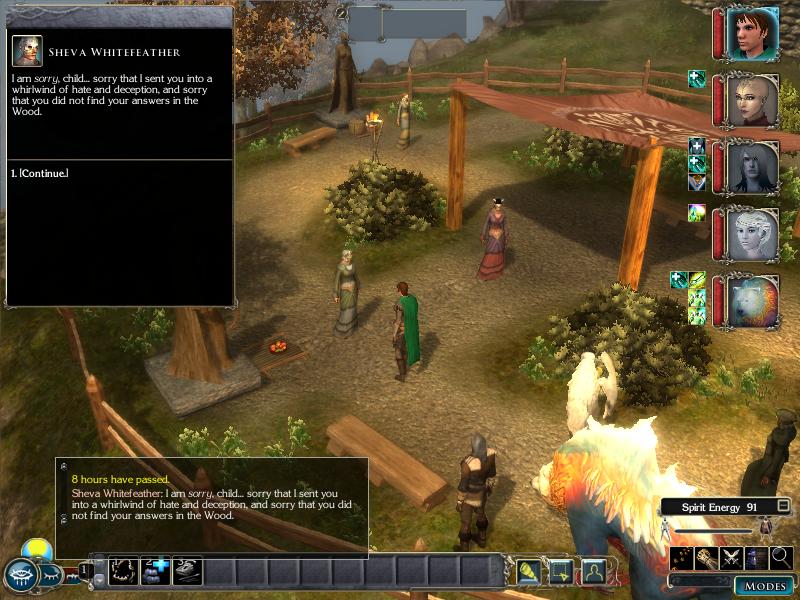
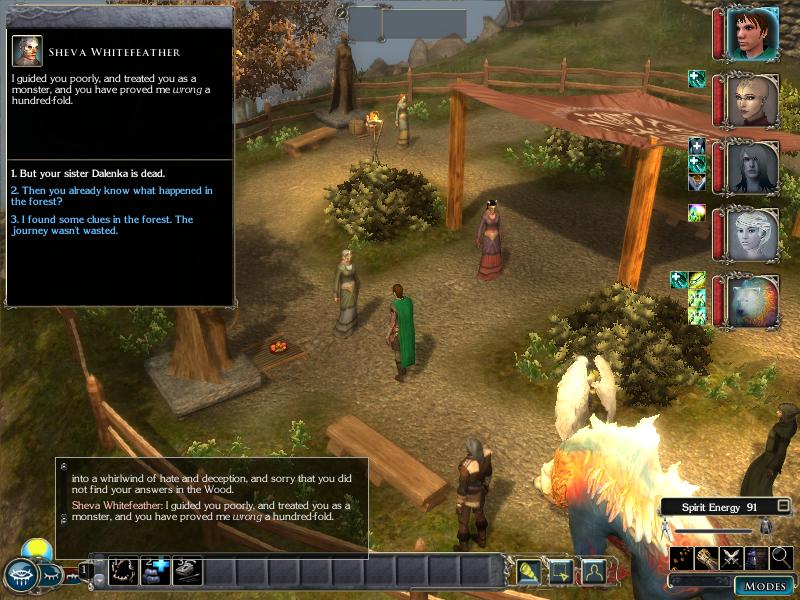
 : Her death is the sin of Nadaj... or perhaps a legacy of the hatred that was born long before you journeyed to the Wood.
: Her death is the sin of Nadaj... or perhaps a legacy of the hatred that was born long before you journeyed to the Wood. : Do not look so surprised, child. Spirits gossip like fishwives, and their whispers reach my ears more quickly than any mortal could travel.
: Do not look so surprised, child. Spirits gossip like fishwives, and their whispers reach my ears more quickly than any mortal could travel. : I know the sacrifice you made to heal the Wood Man's soul. And I know what that risk might have cost you.
: I know the sacrifice you made to heal the Wood Man's soul. And I know what that risk might have cost you. : His injury was caused by the same hunger that seethes within me. I repaid a debt, nothing more.
: His injury was caused by the same hunger that seethes within me. I repaid a debt, nothing more.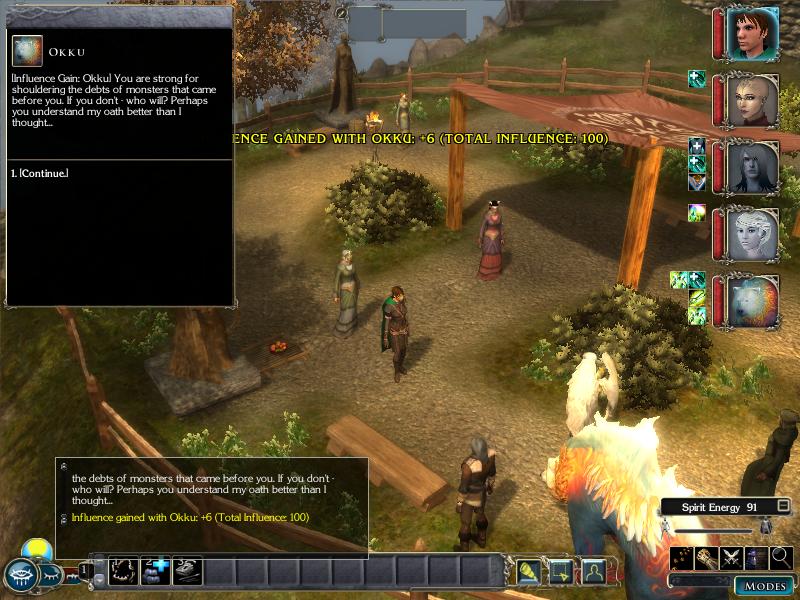
 : Still, the risk to you was real. My gratitude and my trust are yours.
: Still, the risk to you was real. My gratitude and my trust are yours.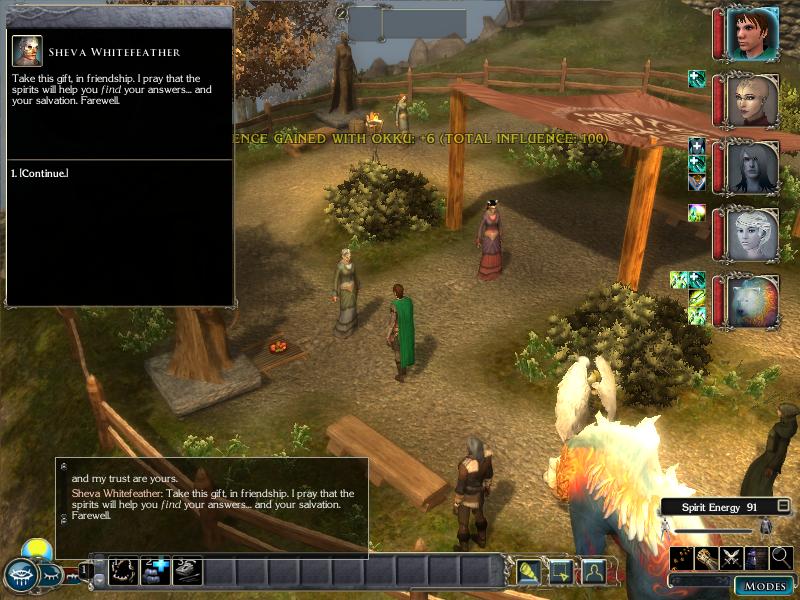
Although we get a better reward for the 'best' solution (saving Dalenka nets us a better treasure item and bonus XP) I prefer the dialogue in this instance. It brings up a few interesting themes that we'll be touching on later.
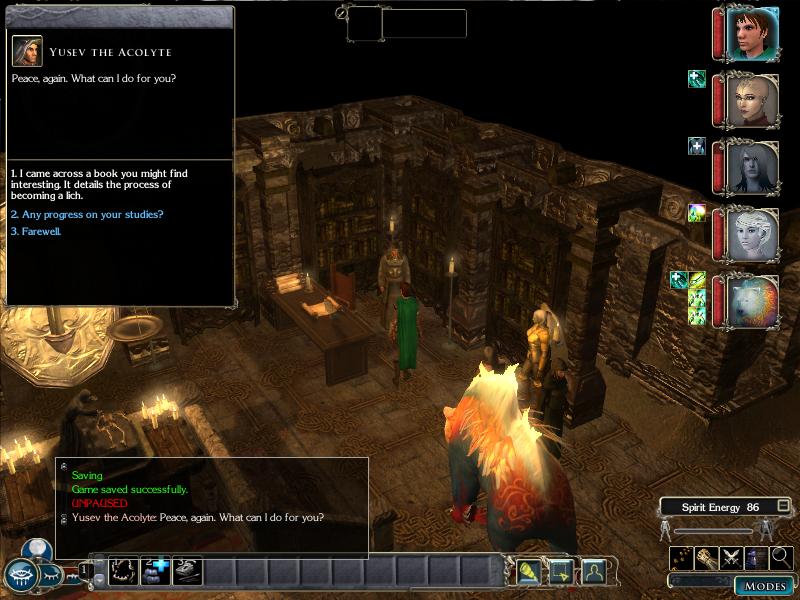
Before I start waffling, though, let's tie up some loose ends. We can bring The Tome of Profane Rebirth to Yusev the aspiring necromancer for quest experience.
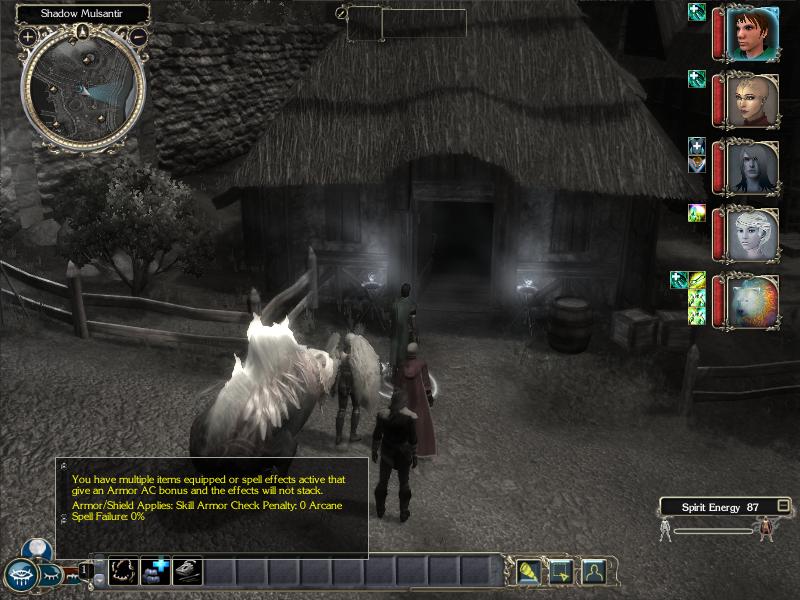
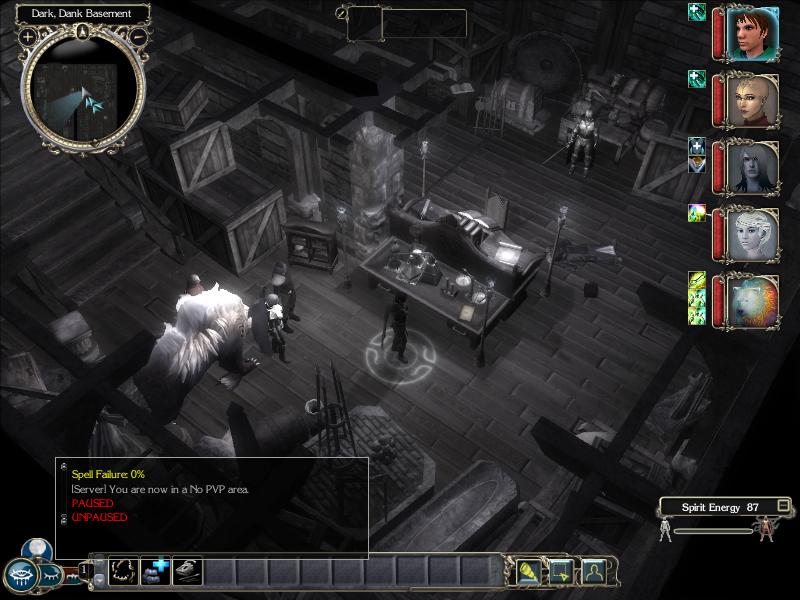
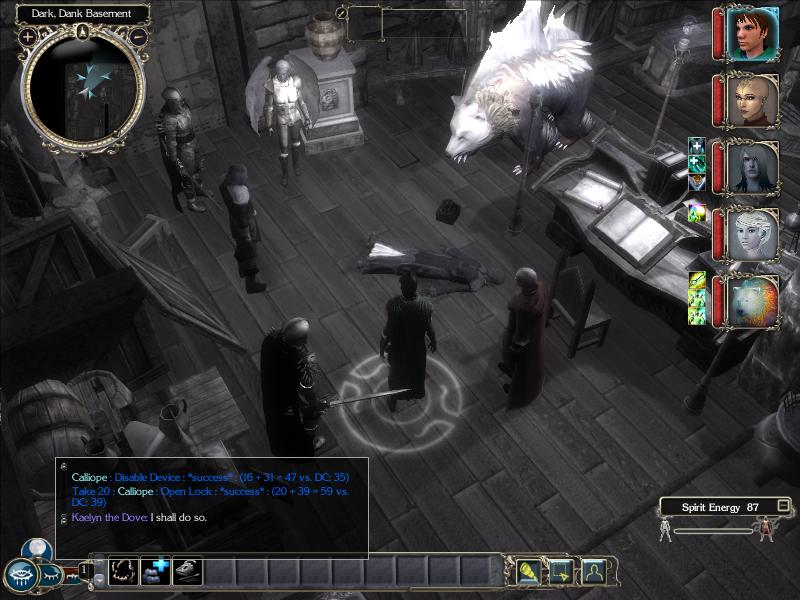
Before that, though, we slip into Shadow Mulsantir and enter the only unlocked home. Heilari the wizard attempted to become a lich in the privacy of the Shadow Plane, but the process failed. We can use the Tome to complete the ritual.
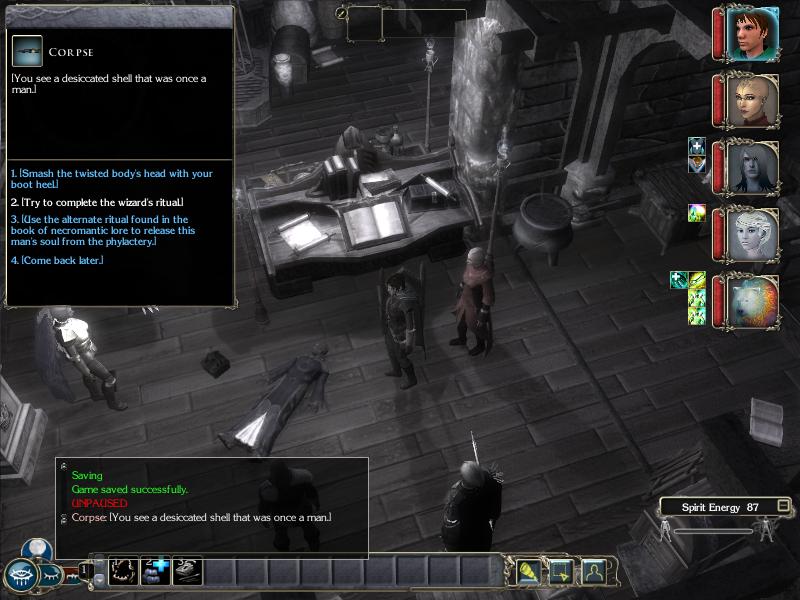
 : Wait. I'm... familiar with this sort of magic. I've never performed this sort of ritual myself, but it seems to be based on Thayan writings...
: Wait. I'm... familiar with this sort of magic. I've never performed this sort of ritual myself, but it seems to be based on Thayan writings... : You sound uncertain.
: You sound uncertain. : His book of lore is of... uncertain quality. It may have been copied from a Thayan tome, but the writer made changes. He was probably trying to improve the process... I doubt he succeeded.
: His book of lore is of... uncertain quality. It may have been copied from a Thayan tome, but the writer made changes. He was probably trying to improve the process... I doubt he succeeded.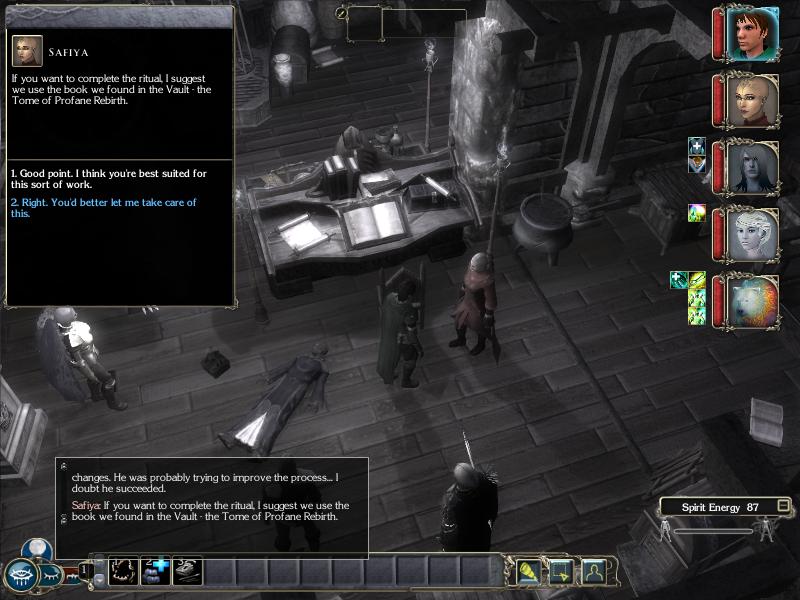
We let Safiya handle it for Influence points. To be honest, though, I just wanted to show one of her interactions. Up to this point it's been mostly Okku and Gann carrying the game; as the game progresses and we slowly move away from Rashemen as a setting, expect Kaelyn and Safiya to come into greater prominence.
In thanks, Heilari gives us a ring and tells us to get out. If you try to complete the ritual without the Myrkulite tome, Heilari is transformed into a ghoulish creature and attacks. Alternatively, as you saw, there's an option to send Heilari's spirit on to the afterlife.
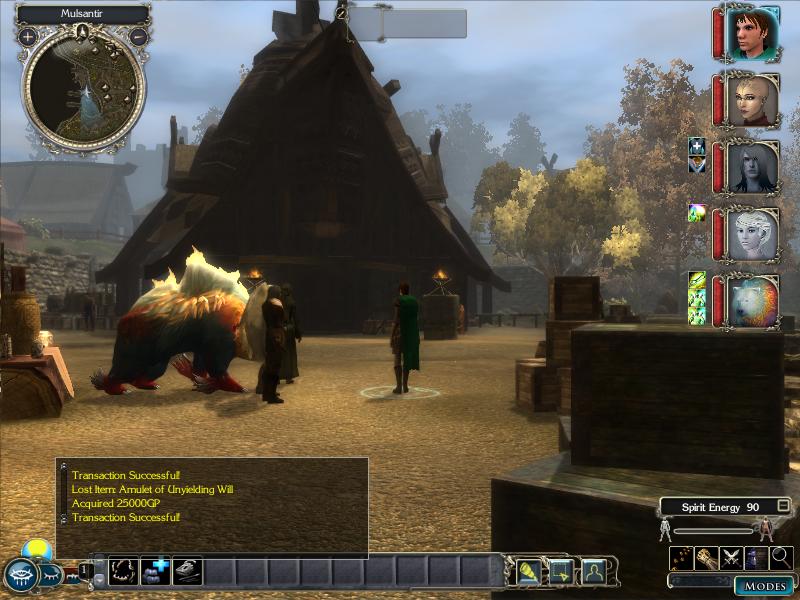
Down in the docks is the Sloop.
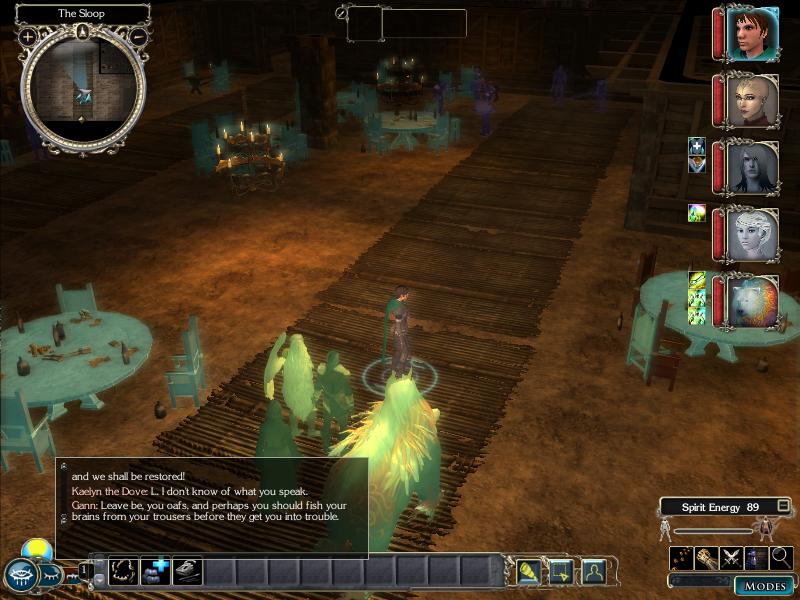
The Sloop
The Sloop's a rough-and-tumble kinda place. It's primarily a bar, but it's got an acting troupe to rival the Veil's. It's not as posh as the Veil, so there's more bar-room brawls, which might explain why everything highlighted is breakable.
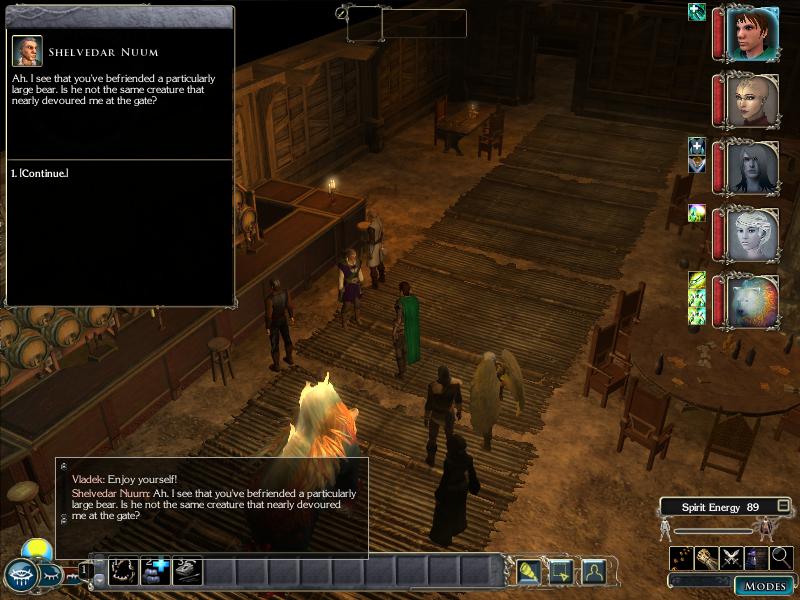
We find Shelvedar Nuum, the helpful half-elven merchant, drinking inside with his guards.
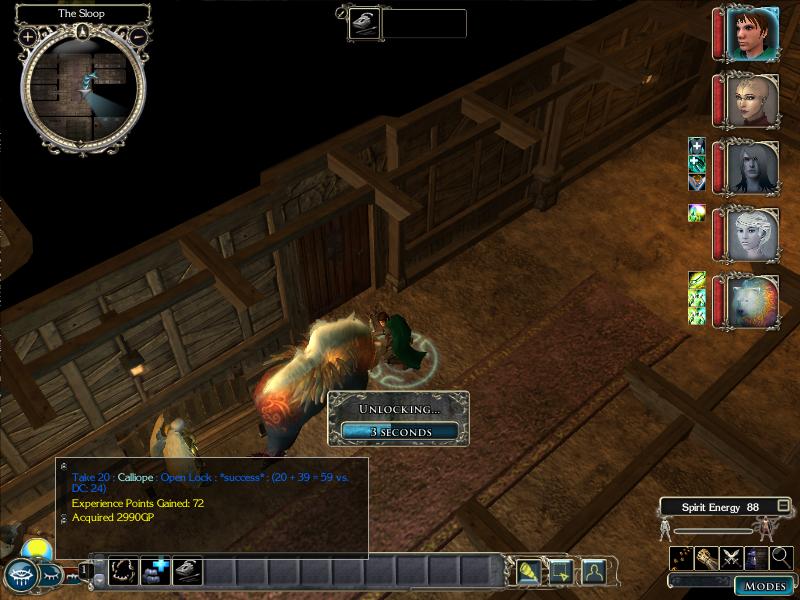
We also find his suite...
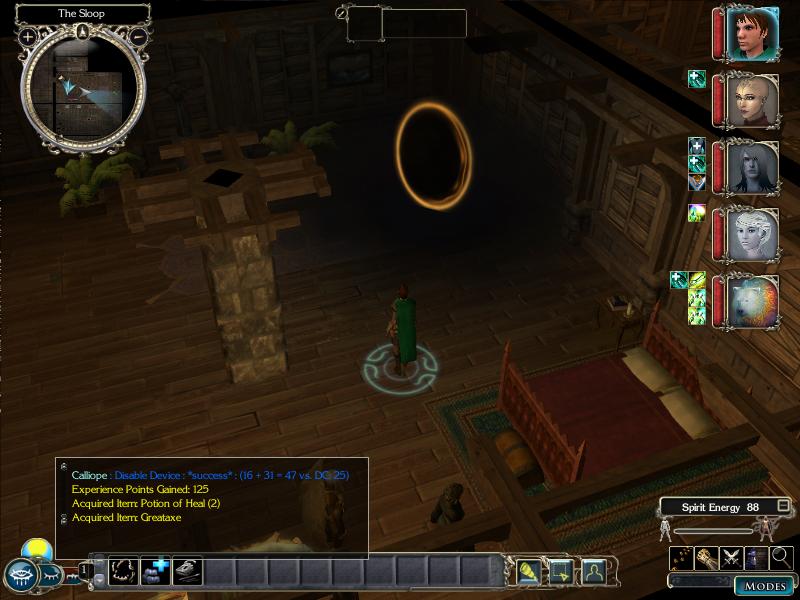
...with a Shadow Portal inside?
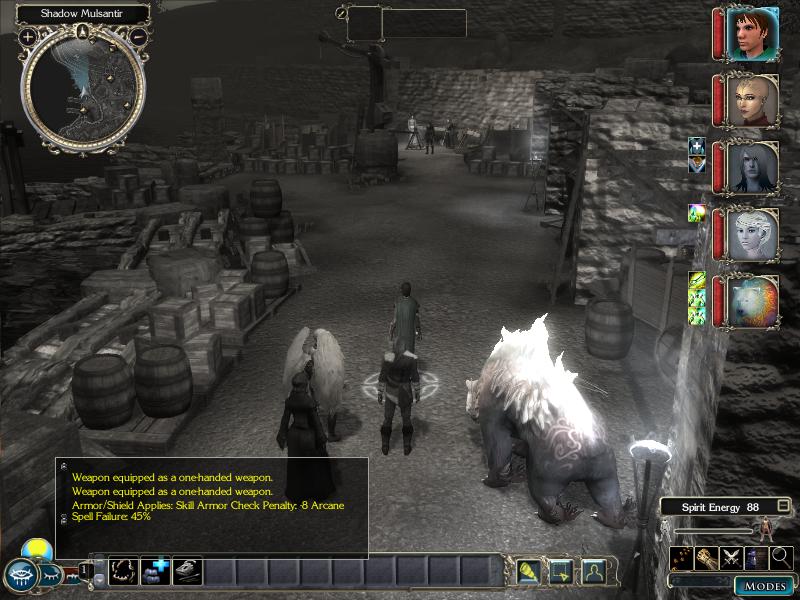
We couldn't access the docks of Shadow Mulsantir from the other portals. The only way here is through Shelvedar's room.
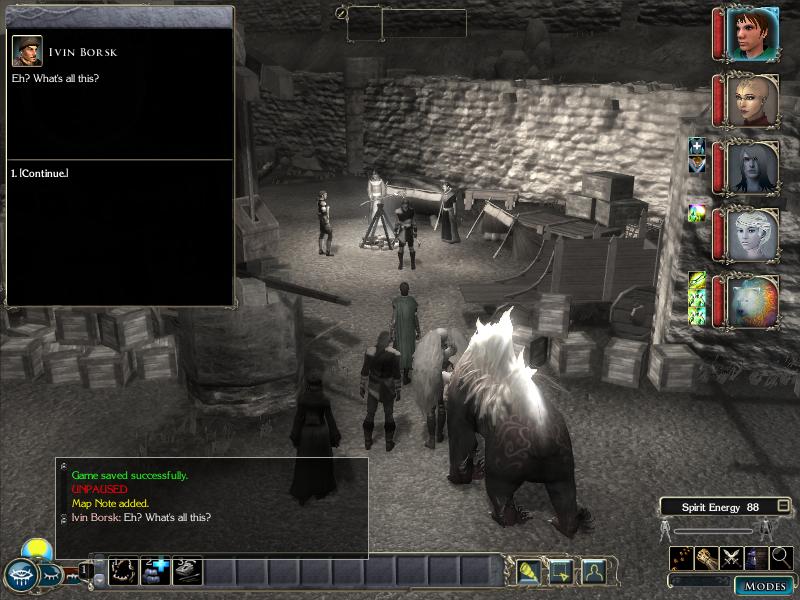
 : Has Shelvedar gone and hired more lugs? What happened to Gullen and Vinck?
: Has Shelvedar gone and hired more lugs? What happened to Gullen and Vinck? : [Bluff] They're dead, and Shelvedar hired me in their place.
: [Bluff] They're dead, and Shelvedar hired me in their place. : [Success] Dead? How? They were trained in the streets of Telflamm... blooded in Shou-town, against the Golden Swords... handpicked by the guildmasters.
: [Success] Dead? How? They were trained in the streets of Telflamm... blooded in Shou-town, against the Golden Swords... handpicked by the guildmasters.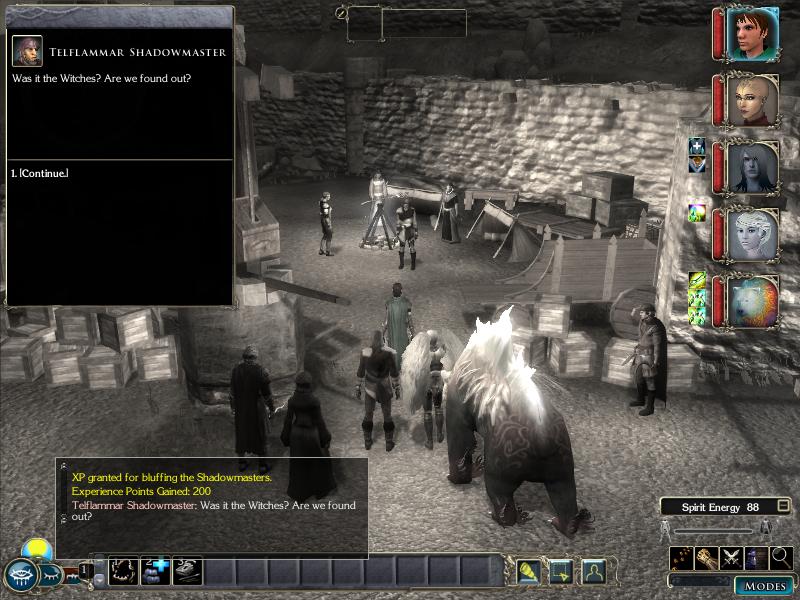
Whoops. These are Bad Guys from Thesk, the country-next-door. And they know Shelvedar.
 : Quiet - keep your wits! And tell me this. Would Shelvedar hire some foreign lout, without asking me first?
: Quiet - keep your wits! And tell me this. Would Shelvedar hire some foreign lout, without asking me first? : I say not. This dog is Whitefeather's spy... or worse, she blundered here on a whim. Either way, it's bad luck for her...
: I say not. This dog is Whitefeather's spy... or worse, she blundered here on a whim. Either way, it's bad luck for her...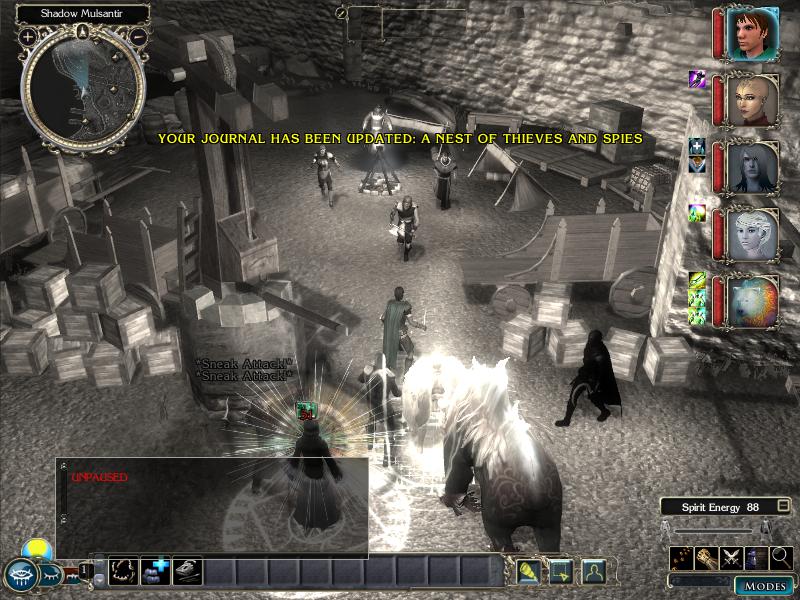
The Shadowmaster fight is another one of those optional challenges for experienced players. A Cleric, a Wizard, and several Rogues make for lots of unpleasant Sneak Attacks.
It's not so bad if you use Bluff to trick the lackeys out of stealth. It's also pretty easy if you wait until after Ashenwood to trigger it.
Anyway, Ivin Borsk has a letter to his higher-ups that incriminates Shelvedar as a Telflammar spy.
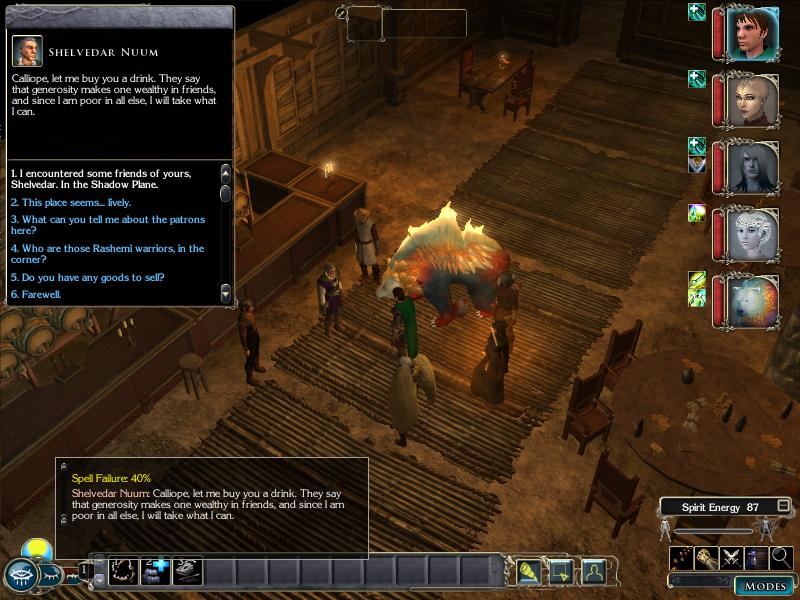
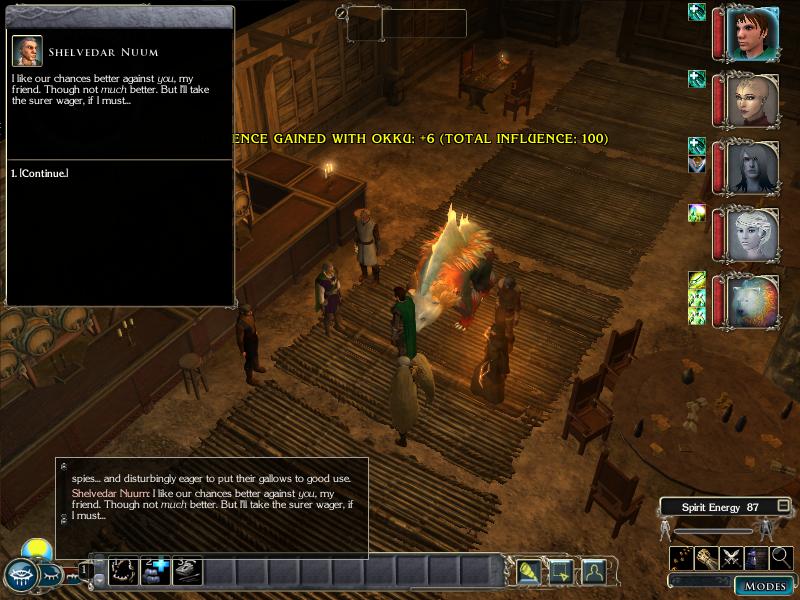
We confront Shelvedar with the evidence and he attacks us. We could've taken a bribe, let him go free to please Kaelyn, or gone straight to the Witches with the letter (but then he'd sneak out of town anyway).
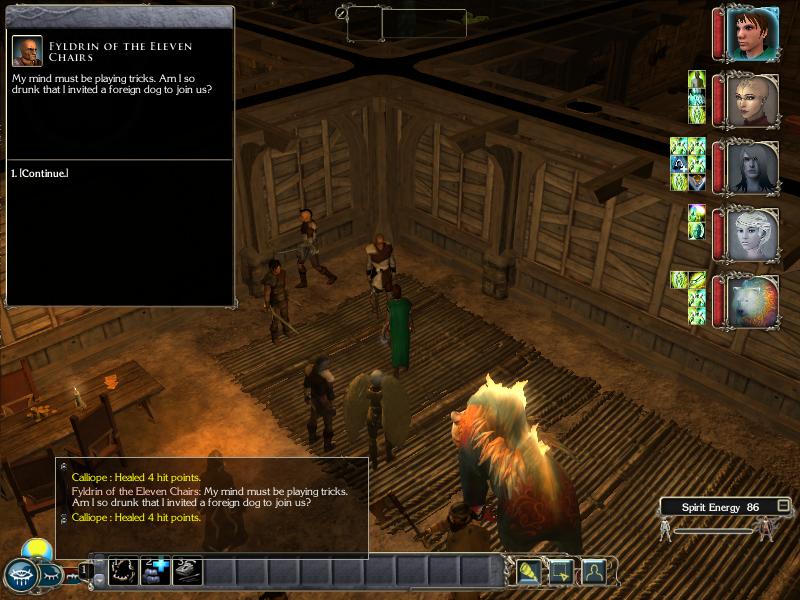
Finally there's some Rashemi braggart sitting in the corner.
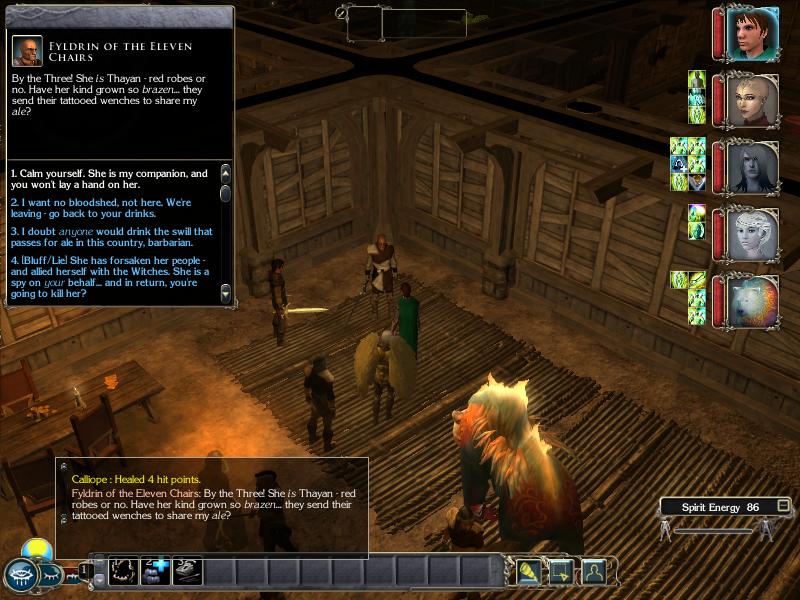
Like any good Rashemi he takes instant offence to Safiya being a Red Wizard and starts a fight.
As though he hadn't just seen us brutally murder three guys barely ten feet away.
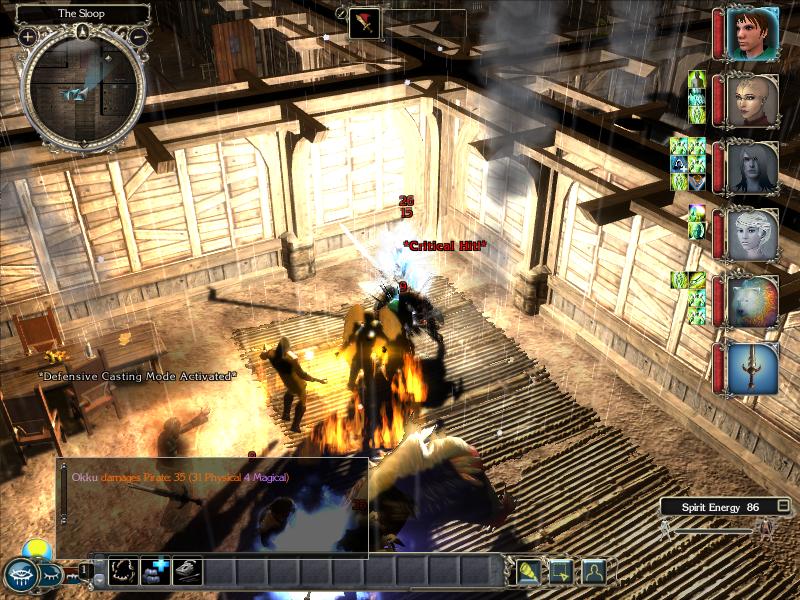
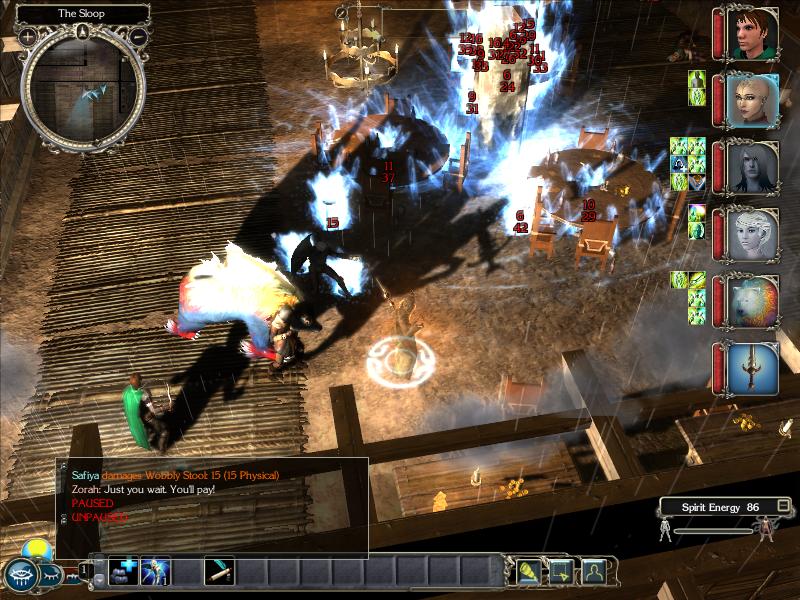
So we end up making a bit of a mess. Hey, we're Epic characters, it's very hard to find spells that don't kill everyone in a hundred yards!
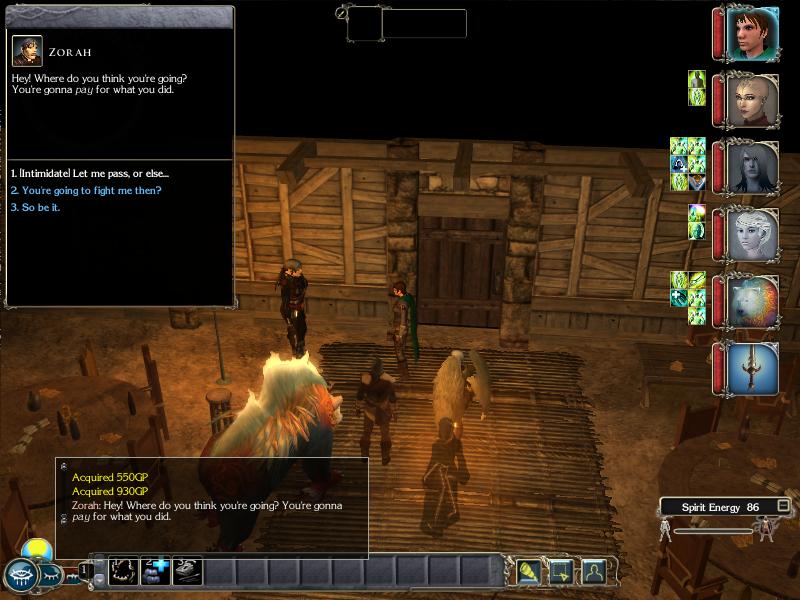
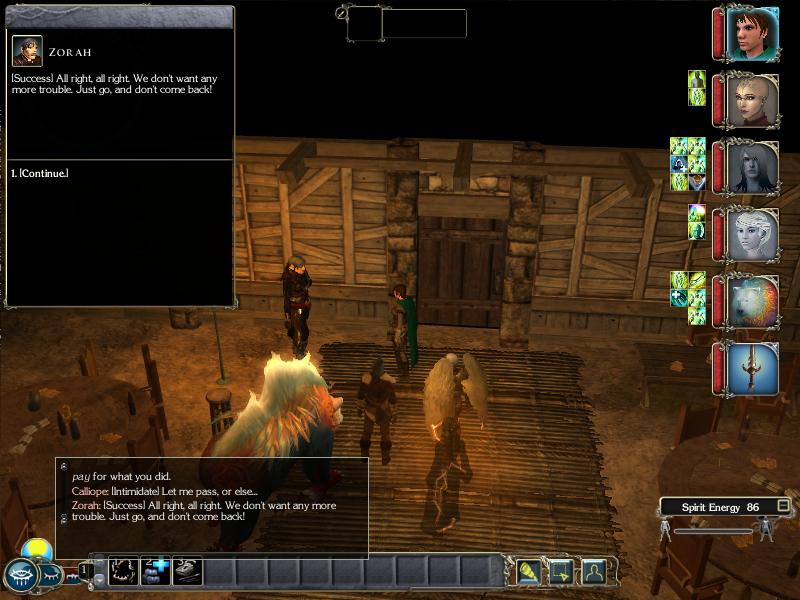
And that puts an end to our field trip.
* * *
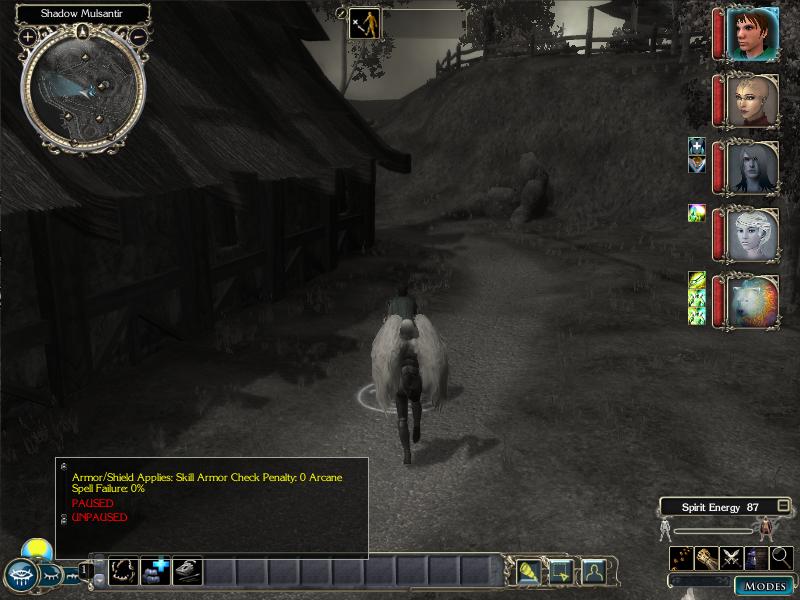
What I wanted to show you, though, was this path down the back of the Shadow Mulsantir berserker lodge.
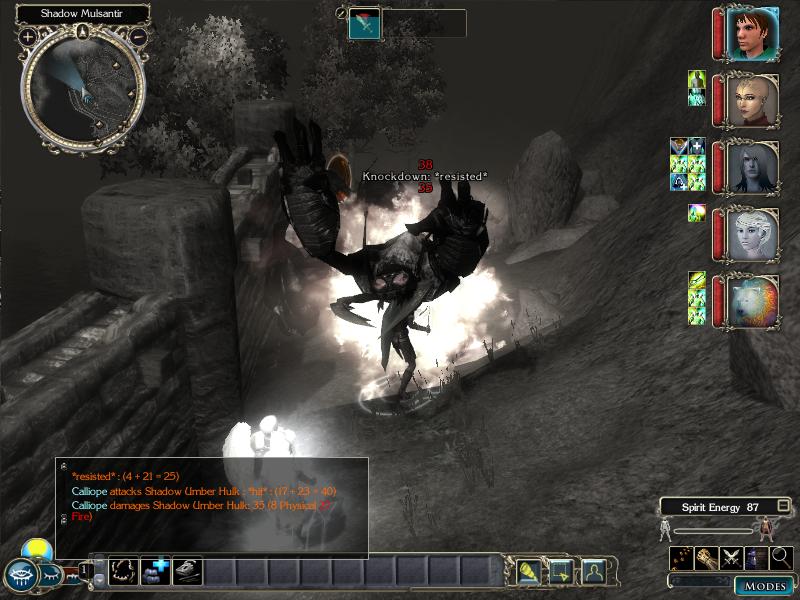
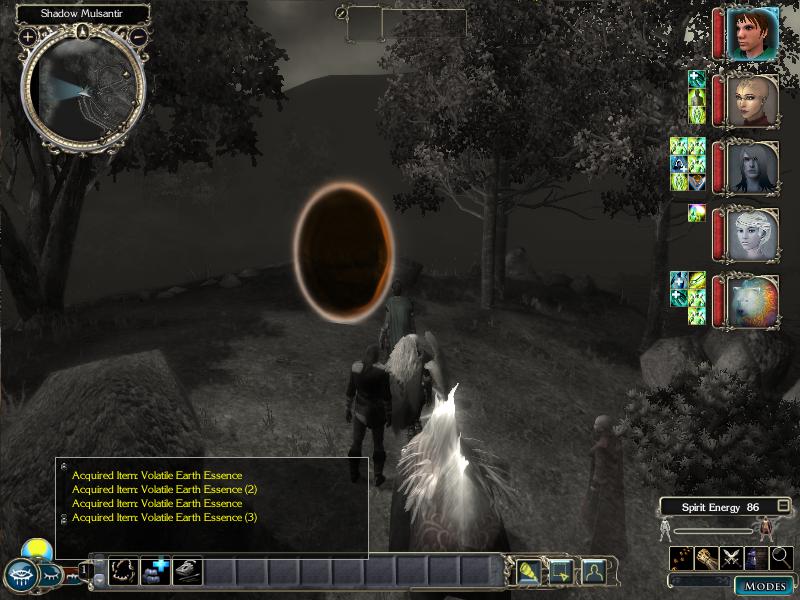
Past the Shadow Umber Hulks is a portal that leads...
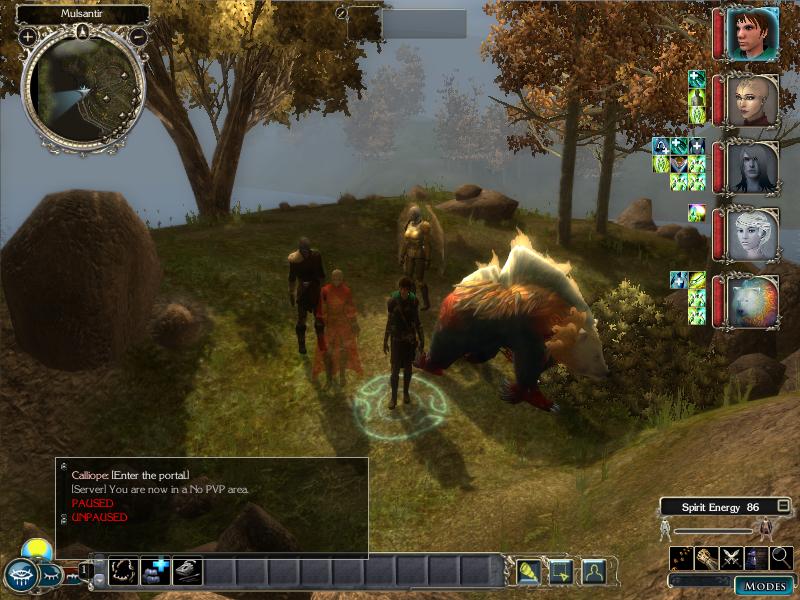
...to a secluded nook at the base of the cliffs in normal Mulsantir, only accessible via Shadow Portals.
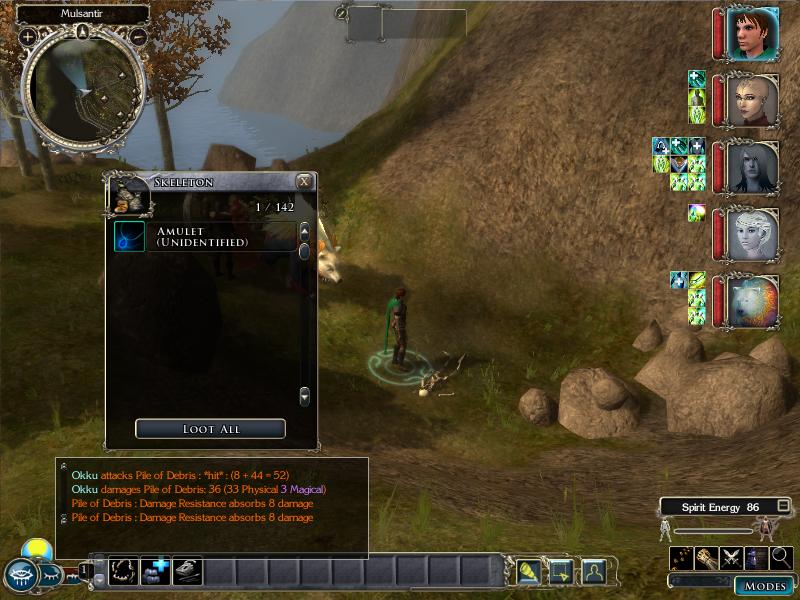
Under some rocks is some hidden treasure. Neato!
It's a good time for a chat, I think.
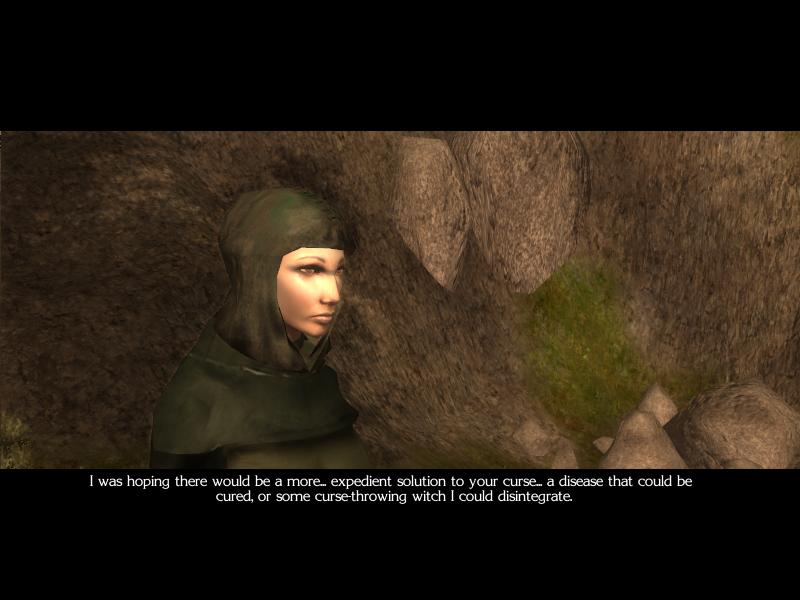
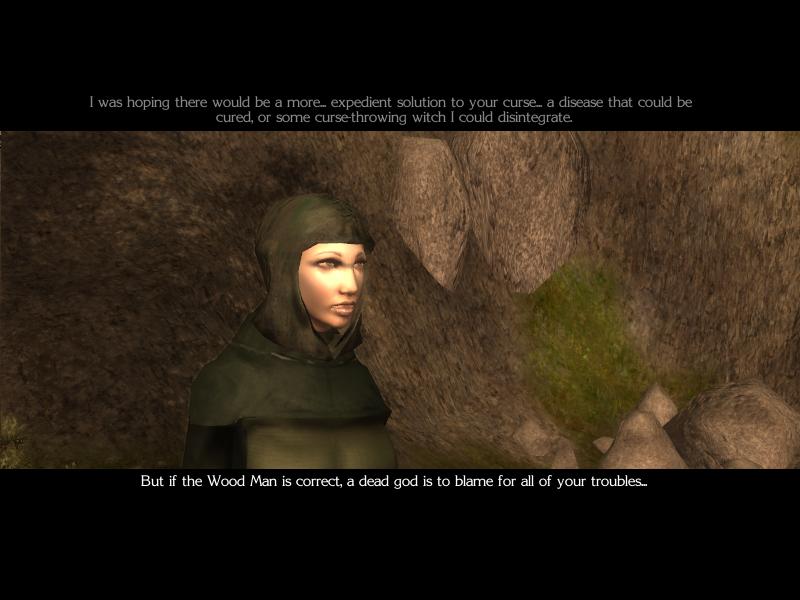
 : Why would a dead god curse me?
: Why would a dead god curse me? : I've read enough to know that the gods often perform acts of unspeakable evil on mortals... usually as tests of faith or punishments for perceived slights.
: I've read enough to know that the gods often perform acts of unspeakable evil on mortals... usually as tests of faith or punishments for perceived slights. : If I was in your place, I've have no end of wrath toward whatever god did this.
: If I was in your place, I've have no end of wrath toward whatever god did this.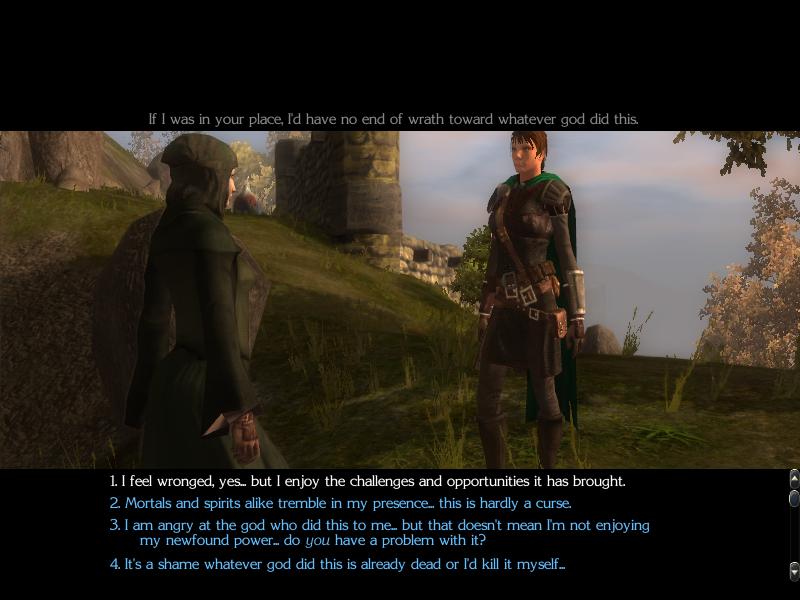
 : I'm... very pleased to hear you say that. You shoulder a dreadful burden but... I'm glad to see you are optimistic nonetheless.
: I'm... very pleased to hear you say that. You shoulder a dreadful burden but... I'm glad to see you are optimistic nonetheless. : And while I would never wish your curse upon anyone, it has proven a fine excuse to travel with you and upset the fine people of Rashemen.
: And while I would never wish your curse upon anyone, it has proven a fine excuse to travel with you and upset the fine people of Rashemen.There's some delicious dramatic irony in this dialogue sequence for readers who've played the game once-through already.
But the thread I want to pick up on today is:
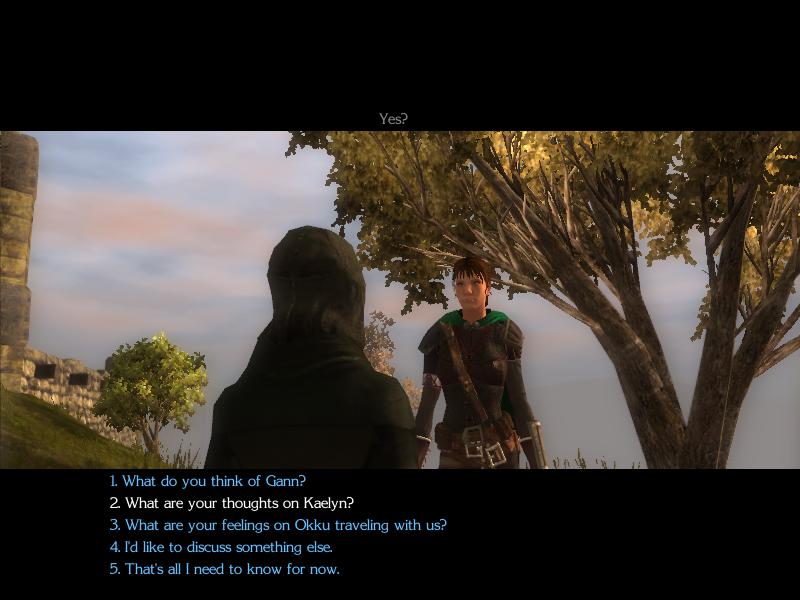
Yeah, I know, I said this was Safiya's update. Maybe I lied!
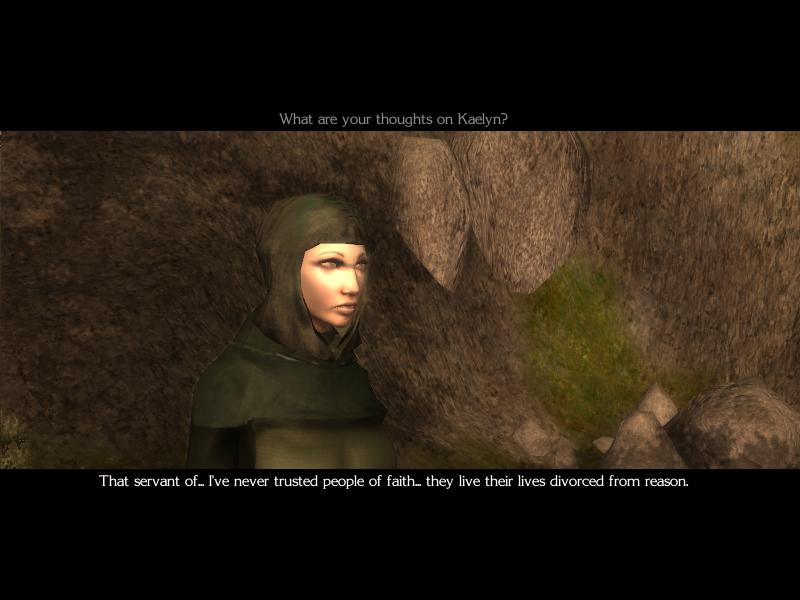
 : Kaelyn is no exception. You can hear in her voice a terminal innocence... if you told her that faith would feed her, she'd happily starve to death and die in prayer.
: Kaelyn is no exception. You can hear in her voice a terminal innocence... if you told her that faith would feed her, she'd happily starve to death and die in prayer. : But you should disregard my prejudice toward the faithful. I trust her - and so should you. She is, in her very blood, a creature of devotion and integrity.
: But you should disregard my prejudice toward the faithful. I trust her - and so should you. She is, in her very blood, a creature of devotion and integrity.Or maybe I didn't. As the famous quote goes:
quote:
"He who fights monsters should look to it that he himself does not become a monster... when you gaze long into the abyss the abyss also gazes into you..." -- The Narrator from Baldur's Gate
which, in my highly specialised and ignorant interpretation, means that a man can be defined by what he stands for but also what he stands against; love and hate are at once both opposite and apposite.
Essentially, Safiya doesn't like gods. She's similar to Gann in that regard, but where Gann's objection is emotional Safiya's is intellectual: namely, faith.
* * *
Gann is the Heathen, Safiya is the Sceptic.
Being a sceptic is hard in the Forgotten Realms. James Randi would be a poor man, what with all the gods, mages, cryptids, priests, ghosts, psionics etc. So making a character that fits the 'Sceptic' archetype is a real challenge - and the way Obsidian expresses Safiya's scepticism is less through rigorous philosophical inquiry and more through a general distrust of 'things that are hidden.' Hence Safiya's distaste for the religious, for the hathrans' masks, and so on.
A less extreme version of this is the basic ideology for the typical fantasy Wizard: a greybearded man who sits in his tower all day, researching spells and experimenting with unusual reagents. A scientist, in essence, which always makes me laugh because the aesthetic for D&D Wizards is largely based on the discipline of Alchemy, whose practitioners believed that they could turn lead into gold.
Then again, alchemists and their descendants eventually turned into the scientists we know and love today, so never mind what I think. Classic example: Sir Isaac Newton, who created the Laws of Motion, and split light into seven colours... not because there were seven colours to see but because seven was a 'special' number. Now that's science!
* * *
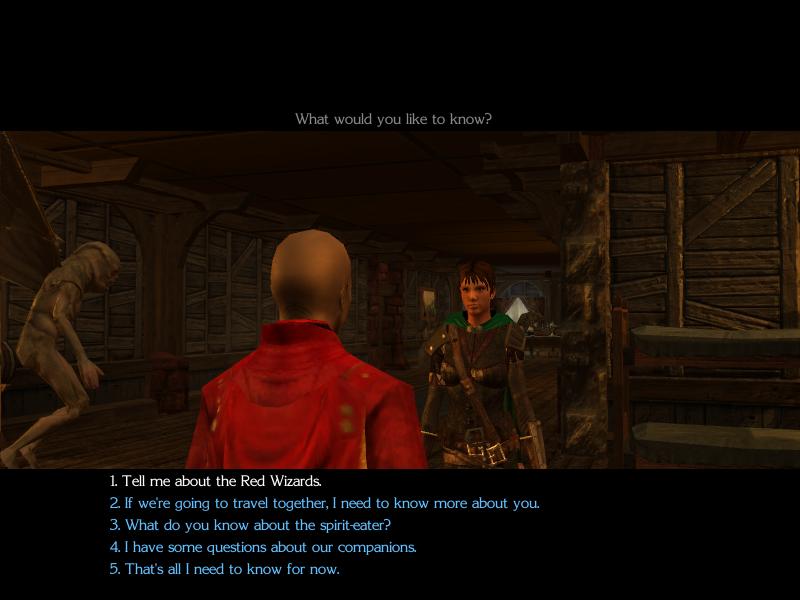
So if Safiya is a scientist, then what are the Red Wizards?
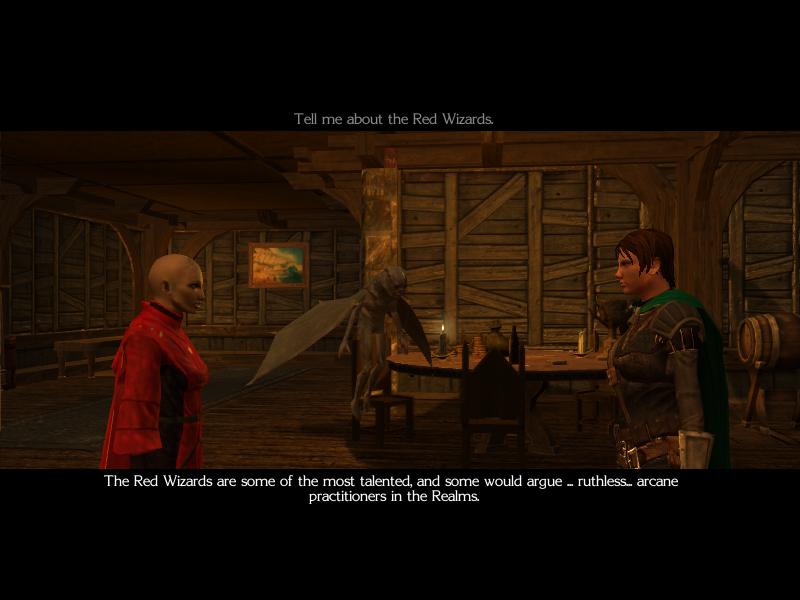
 : Nearly every ruler and authority figure in Thay swears allegiance to the Red Wizards. We are usually judged as tyrants first, and mages second.
: Nearly every ruler and authority figure in Thay swears allegiance to the Red Wizards. We are usually judged as tyrants first, and mages second. : You seem more of a scholar than a tyrant.
: You seem more of a scholar than a tyrant. : I am an instructor at the Academy of Shapers and Binders. I teach transmutive and transformative magic - my specialty.
: I am an instructor at the Academy of Shapers and Binders. I teach transmutive and transformative magic - my specialty. : Most people assume that we're all disciples of one secretive school. But there are hundreds of academies.
: Most people assume that we're all disciples of one secretive school. But there are hundreds of academies.Weirdly enough I don't think Safiya is actually describing the Red Wizards (or scientists) at all here. Then again, practically everything Safiya's told us has or will turn out to be untrue.
And yet she's still our most trustworthy companion.
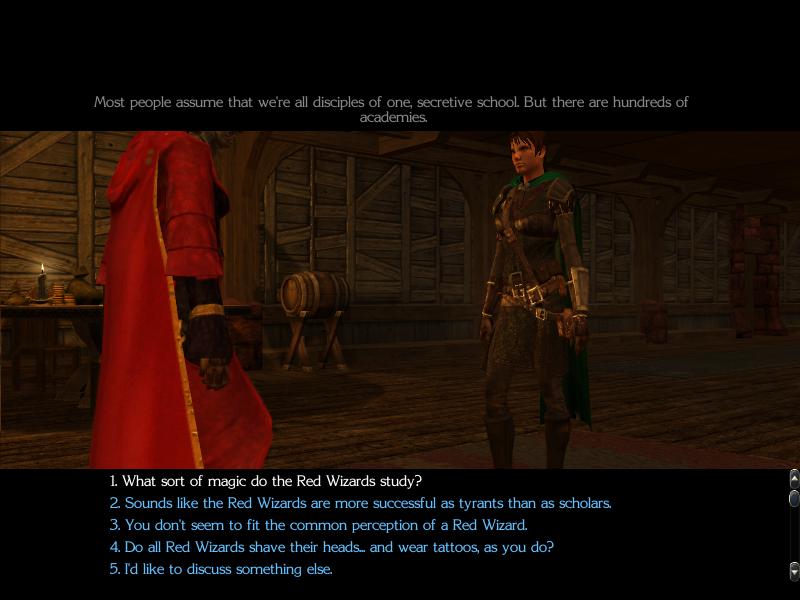
 : We commit the whole of our lives to a single aspect of arcane magic - those who wish to learn a little bit of everything lack the focus and discipline we demand.
: We commit the whole of our lives to a single aspect of arcane magic - those who wish to learn a little bit of everything lack the focus and discipline we demand. : I find transformative magic... fascinating. I work with spells that can add a spark of life to otherwise inanimate materials.
: I find transformative magic... fascinating. I work with spells that can add a spark of life to otherwise inanimate materials.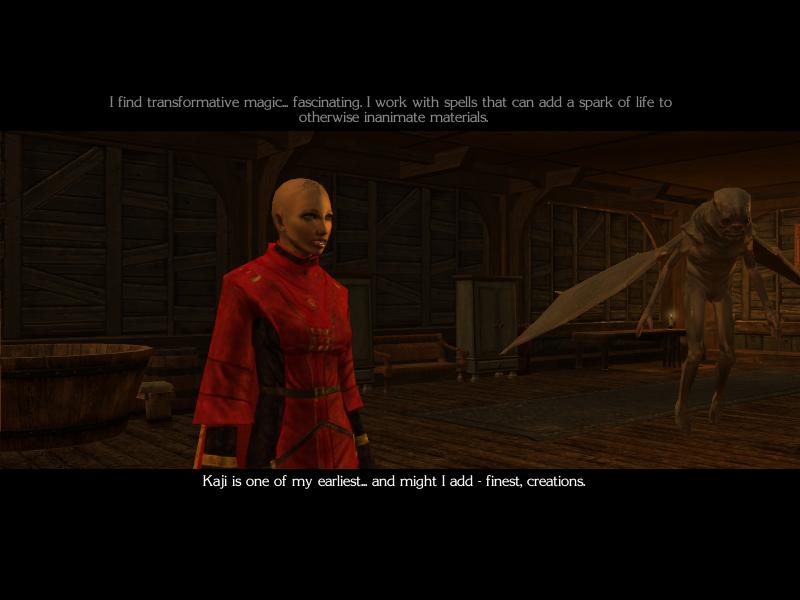
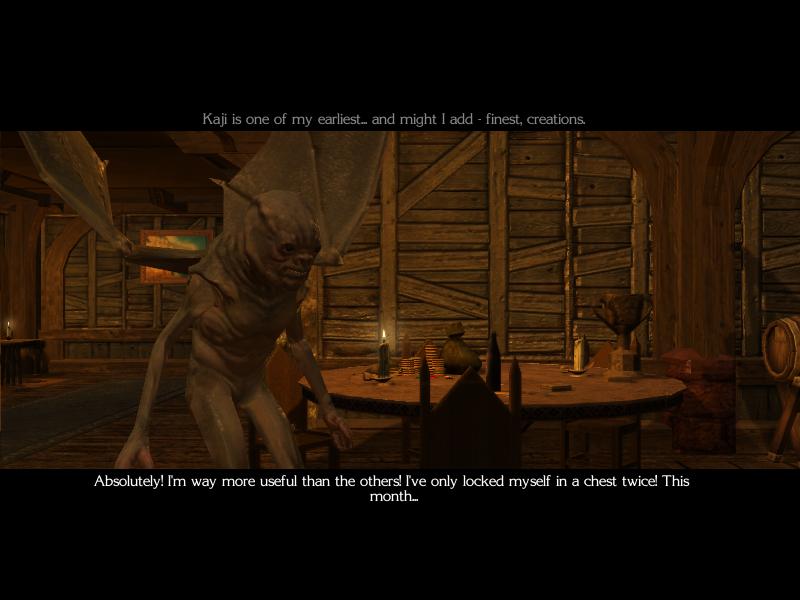
 : The students of my academy mostly focus on the... rather morbid arts of binding and altering souls.
: The students of my academy mostly focus on the... rather morbid arts of binding and altering souls. : You don't seem to fit the common perception of a Red Wizard.
: You don't seem to fit the common perception of a Red Wizard. : You are kind to say that. I was fortunate to be raised by my mother and Master Djafi. The two of them made certain that I grew up to be a magician, not a despot.
: You are kind to say that. I was fortunate to be raised by my mother and Master Djafi. The two of them made certain that I grew up to be a magician, not a despot.Quick sidestep into a different dialogue track: Safiya's voices-in-the-head. Latent schizophrenia or something more?
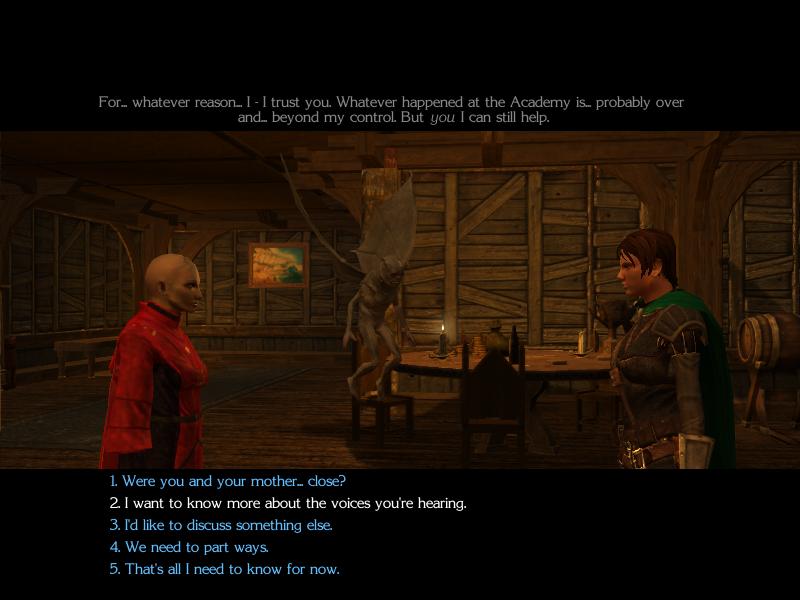
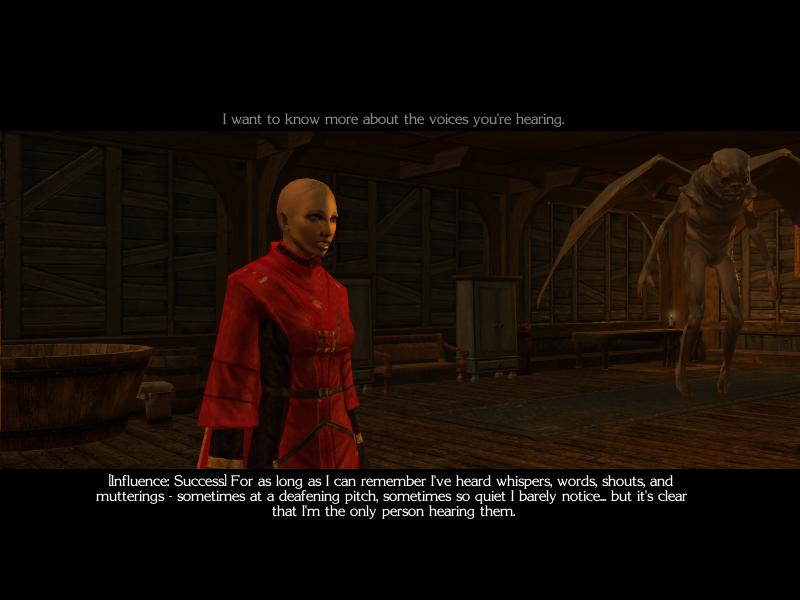
 : For a very, very long time I... I thought the voices were a sign that my mind was... peculiar at best and... fatally unhinged at worst.
: For a very, very long time I... I thought the voices were a sign that my mind was... peculiar at best and... fatally unhinged at worst. : And before you ask - no, the voices have never taken control of me or forced me into action.
: And before you ask - no, the voices have never taken control of me or forced me into action. : What do the voices usually say?
: What do the voices usually say? : Most often - gibberish. Fragments of words... sentences so quiet they might as well be a mumble...
: Most often - gibberish. Fragments of words... sentences so quiet they might as well be a mumble...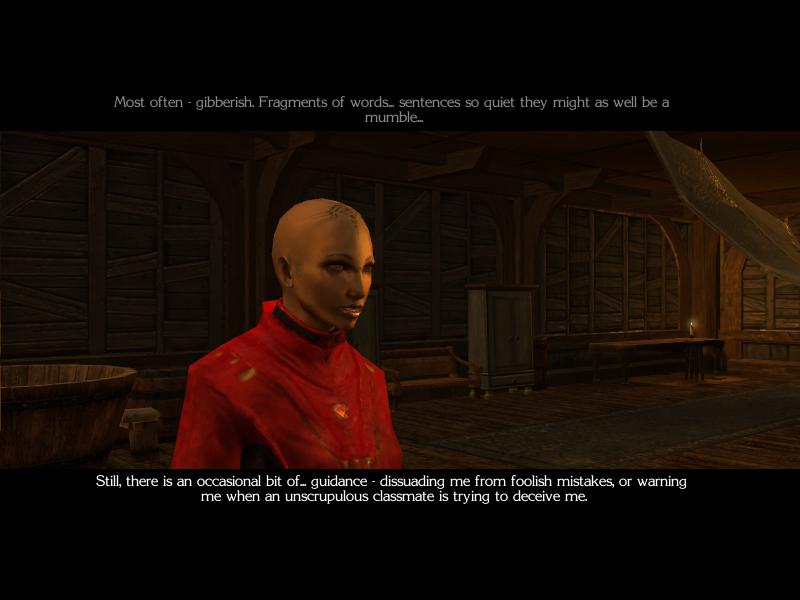
Hmm, results are inconclusive. However, I wasn't really interested in the factual answer. I'd rather use this question to shed light on another, more interesting one:
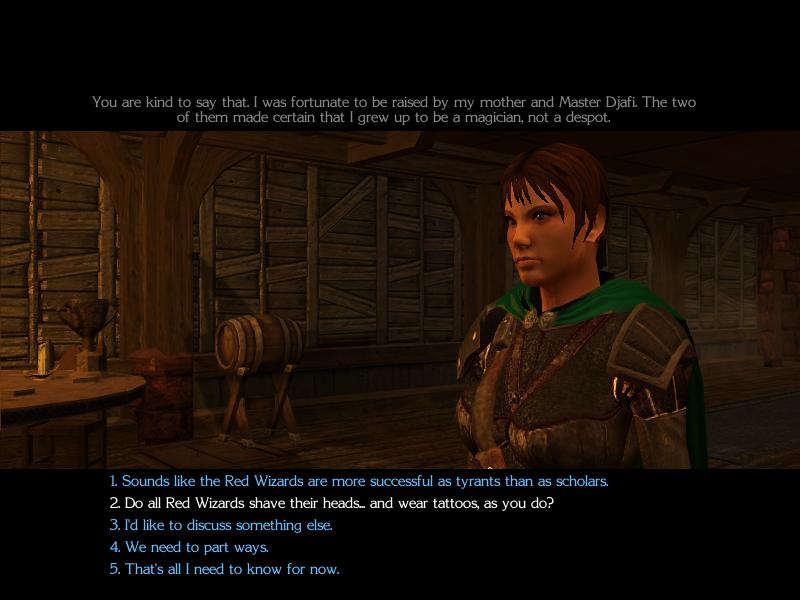
This has already come up in the thread, and a few clever posters have posted wrong answers.
The correct answer is:
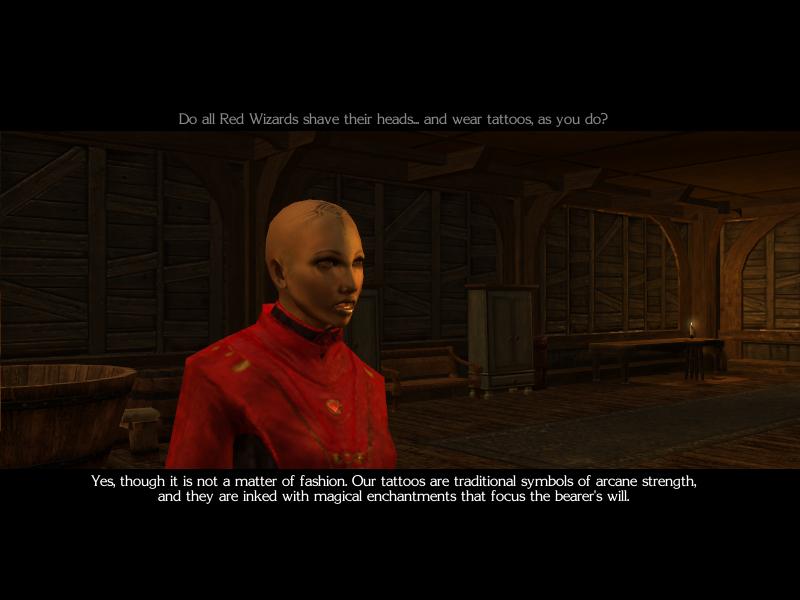
And you say, "Yes, that's what I said!" But the correct answer isn't necessarily the true answer...
Do you know why I think Red Wizards shave their heads and wear tattoos?
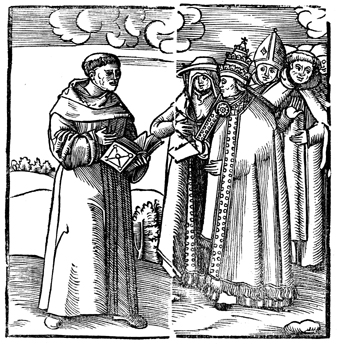
Yah.
A group of strange weirdos with supernatural powers who sequester themselves in a secluded location, hear strange voices, wear the same clothes and have the same haircut?
I don't think the Red Wizards are scientists, I think they're monks. Eastern monasticism especially is a good match for Safiya's baldness. Alternatively, you might consider the term cult.
This isn't as dumb as it sounds. The temptation (for me anyway) is to consider religion to be dogmatic: fusty, conservative, unchanging, faithful. Science by contrast is progressive and going places, constantly re-evaluating itself and the world around it. But this isn't entirely true, is it? Different sects and denominations place varying importance on scripture/the writings of religious leaders, and religious texts are regularly reinterpreted by theologians and other scholars. Prior to the Enlightenment religion was science; the clerical classes were, more or less, the only ones who could read and write facts about the world. Let's be honest, scientists and priests share a job: explaining how everything works.
Don't get me wrong, I'm not attempting an equivocation of science and religion. Empirical positivism is the superior methodology for Finding Shit Out. But from a cultural perspective, the same basic process is going on: someone asks a question and the elders answer. What's changed is a shift from a largely narrative-based cosmos ("Thunder is God taking his shoes off") to a rationalistic one ("Thunder is the sound produced by electrical discharge in the atmosphere"). Specifically, we're moving from a "human-based" cosmos, in which the world is just like your life but bigger, to an impartial cosmos, in which the world works on processes. And in narrative cosmology, things like Death and Creation are related to things that happen in normal human life. That's why God is a man with a big flowing beard, that's why death is a kingdom with gates and scary boatmen.
So when Safiya says "Gods? Haw! I am a seeker of truth," just remember that she and Kaelyn are sisters from another planet.
But, again, I gotta admit the above is largely all my doing. This probably wasn't what Obsidian was thinking when they created the Safiya character. Personally, I think there's some merit to the idea... but don't just take my word for it.